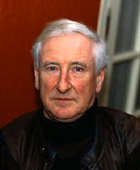John Montague was born in Brooklyn, New York in 1929. At the age of four he was sent to live with his father's sisters at Garvaghey, Co. Tyrone. Since the early 1970s Cork has been his home, so he is included here as an honorary Munsterman. Montague is well travelled. He was educated at St. Patrick's College, Armagh, University College Dublin and Yale. He was Paris correspondent for the Irish Times where he met his first wife, Madeleine, a French aristocrat.
His first book of poems Forms of Exile was published in 1958. He has gone on to publish a substantial body of poetry as well as two collections of short stories, an autobiographical novella and a book of memoirs entitled Company. He continues to write and publish substantial poetry in his seventies. In the 1970s after the major success of The Rough Field Montague was invited to teach at University College Cork by Professor and poet Sean Lucy. He settled in Grattan Hill (erstwhile residence of Thackery) with his second wife Evelyn (heroine of his poem sequence The Great Cloak) with whom he has had two daughters Oonagh (the actress) and Sibyl (the printmaker). His third wife is the New York novelist Elizabeth Wassell. In 1998 Montague was the inaugural occupant of the Ireland Chair of Poetry. Montague has been credited with encouraging a whole generation of Munster poets who studied at UCC, among them: Maurice Riordan, Thomas McCarthy, Theo Dorgan, Gerry Murphy, Sean Dunne, Greg Delanty, Liz O'Donoghue and Patrick Cotter.
Montague is one of the major Irish poets of the 20th Century. The American critic Harold Bloom has Montague in his selection for what he considers The Canon. Montague's American instincts provide, along with Thomas Kinsella, an important counterweight to the more British influences of other major poets from Northern Ireland such as Seamus Heaney, Michael Longley and Derek Mahon. Montague's example has encouraged a younger generation of Munster poets to be more cosmopolitan in their influences, drawing inspiration from European as well as American and British influences (Irish influences must be taken for granted, even in the work of Gerry Murphy.) |






